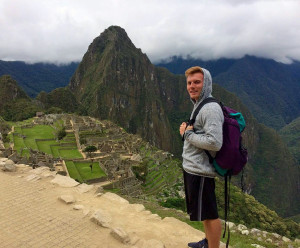CHS grad excited for next chapter after harrowing medical ordeal
By Jay Turner
Spencer Cox (left) glides over the Rio de Janeiro coastline during a memorable trip to South America last winter.
Editor’s note: Charles “Spencer” Cox III passed away March 9, 2018, at the age of 20. Visit roache-pushard.com for his obituary and funeral arrangements.
***
As a self-proclaimed free spirit and budding world traveler, Spencer Cox has packed more adventures into his 20 short years than some people get to experience in a lifetime.
By the age of 14, the Canton native and CHS graduate was already flying on his own, including trips to California to attend a youth leadership camp and to Florida to visit family friends. As a high school senior, he traveled to Germany as part of the CHS German Exchange program, and last winter he spent a month traveling around South America with a high school friend and former teammate, exploring exotic locales from Rio De Janeiro to the Inca ruins of Machu Picchu.
The way that Cox explains it, traveling and seeking out new experiences are more than just passing interests of his; they are a mindset and a way of life — and achievable, he insists, on a much smaller budget than most people realize. Even his choice of college major was inspired in part by his growing sense of wanderlust: international business with a minor in finance.
So when he woke up in a Vermont hospital last March with a shunt in his skull attached to a bag of cerebrospinal fluid, it’s not all that surprising that he would be focused less on his prognosis than on his next planned excursion — a hiking trip a few miles east of his college campus in Burlington.
“I said, ‘Can you get me out of here soon because I’m going to climb Mt. Mansfield this weekend,’” recalled Cox of the exchange with doctors, one in which he first learned of the large mass growing inside the center of his brain.
The news was quite surreal and also pretty shocking, acknowledged Cox, who had displayed few symptoms other than occasional head and neck pain in the months prior and whose last memory before his hospitalization was getting sick on the Champlain College team bus on the way to a rugby match. He remembers vomiting and then struggling to breathe, and when his coach asked him what his name was he couldn’t come up with the answer.
Cox said he has no memory of being driven to a hospital in Rutland, where they first discovered the tumor, or being airlifted to UVM Medical Center, where they installed the shunt to relieve the pressure and swelling in his brain.
Suffice it to say, Cox would not make it anywhere near the summit of Mt. Mansfield that weekend, and his spring semester also had to be cut short as he was transported to Boston Children’s Hospital for further testing and treatment. There, following an unsuccessful surgical attempt, he received the second major bombshell — that the tumor was in fact cancerous and would require an extensive and grueling treatment protocol.
***
As he looks back on the whirlwind events of the past year, Cox cannot escape the notion that he somehow had a hand in his own diagnosis.
“This is going to sound crazy,” he said, “but one of my friends had been diagnosed about a month before, and I remember thinking to myself that I could handle cancer. Then four weeks later I woke up with a tumor.”
“You know, I always say that the universe gives you what you ask for — good or bad.”
In Cox’s case, the universe seemed to offer him plenty of the latter, yet he prided himself on his positive outlook and he relied on the support of loved ones to make it through some of his darkest days.
Drawing on philosophies he learned from his mother as well as from the youth leadership camp he attended, Cox approached his illness as a temporary setback and something that he could largely control.
“It’s just like anything else: You can give the power over or you can take it,” he explained. “To me, it was a choice. If you say you’re fine then you’ll feel fine; if you say you feel crappy then you’ll feel crappy.”
Still, no amount of positive thinking could completely neutralize the side effects he felt from high-dose chemotherapy, which Cox endured for several months following an initial round of proton radiation treatments at Mass. General Hospital.
“The chemo was horrible; it was absolutely terrible,” he said. “It felt like my soul was doused in gasoline and lit on fire. That’s the only way I can describe it.”
Constantly nauseous and unable to eat, Cox said he lost more than 20 pounds before he found a “lifesaver” in the form of medical marijuana, which helped him get through the last few months of his chemotherapy treatments. “I started to use it more heavily toward the midway point of my chemo, and it had an extreme positive change,” he said. “I went from not eating for weeks to eating several times a day.”
As for the mental battle he waged during his many months of treatment, Cox said he surprised a lot of people with his upbeat attitude but admitted it was tough to be cooped up at home and not on the ski slopes or out chasing his next adventure.
Asked if he was ever scared or if he thought about death and the possibility of dying, Cox was brutally honest, acknowledging that it did cross his mind from time to time yet it was nothing compared to the sense of hopelessness he felt after his father committed suicide four years ago.
Cox said his father was a great dad and a kind and gentle soul — someone who was made to be “running in the woods like a camp counselor” rather than working as a financial planner. His death, Cox said, took him completely by surprise and “really made [him] question life.”
“It really made me wonder, ‘What are we doing here and what is the point of all this?’” he said. “That was more painful in the sense that I couldn’t control it.
“Cancer is something I could control more than someone that I cared about committing suicide. So it was a lot easier in the sense that you could actually do something about it.”
***
It has now been three and a half months since Cox finished chemo and probably the clearest sign that he is feeling back to his old self is that he is traveling again.
Already he has gone to Florida and to Spain with his mom and siblings, and tomorrow he will depart for Paris to meet up with a friend who is doing an internship there. He plans to travel around Europe and figures to stay for about four weeks, although he only bought a one-way ticket and nothing is etched in stone at this point.
In the fall, Cox will reenroll at Champlain College, starting with a semester abroad in Dublin. He has also been taking classes at Massasoit in order to catch up and he recently applied for an internship opportunity with a Colorado-based company.
In terms of his physical health, Cox said he feels great and is getting close to the shape he was in as a freshman at Champlain, when he was playing rugby every day and was “158 pounds of solid muscle.”
He still has the tumor in his brain; however, it is considerably smaller and doctors recently declared it “inactive” following a PET scan. He also has an internal shunt in place that drains fluid from his brain to his bladder. Yet he no longer wakes up thinking about his medical condition and has personally declared himself cancer-free — even if his doctors are not quite willing to make that same declaration.
Cox said he will definitely not miss having no hair and getting odd looks from strangers, but he’d be lying if he said the sympathy didn’t feel nice at times, adding, half-jokingly, that the “cancer card is the most powerful card [he’s] ever come across.”
At the same time, he said, it was “just cancer,” and by demystifying the illness Cox felt that he was able to gain power over it.
“It was definitely scary,” he said of the diagnosis and subsequent treatments. “But I was never really doubtful. I always looked at it the other way, saying, ‘I’m going to get over this. I’m going to beat it.’”
Short URL: https://www.thecantoncitizen.com/?p=38364











